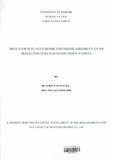| dc.description.abstract | Kenya is currently engaged in trade negotiations with the European Union (EU) through the
framework of the African Caribbean and Pacific (ACP) countries – (EU) relations. Kenya is
negotiating under the auspices of the East Africa Community. Once these negotiations are
concluded Kenya is required to signs Economic Partnership Agreements whose content has been
widely criticized.
Unlike its predecessor, Cotonou Agreement was founded on the foundation of among other the
respect for International Convention on Economic, Social and Cultural Rights (ICESCR) the
EPAs are founded on the trade liberalization theory. The aim of EPAs is to establish a regime
that is compatible to international trade principles as envisaged within the WTO framework. The
WTO framework gives minimal consideration for human rights hence a WTO compliant EPAs
may see EAC countries enjoying less social and economic rights than they are currently.
The theme of this paper, therefore, is to interrogate the content of the EPAs, Kenya’s obligations
under EPAS and establish whether they indeed violate the socio-economic rights of developing
countries, particularly Kenya. The study further proposes possible alterations that will see
preservation of social-economic rights of Kenyans. | en |

